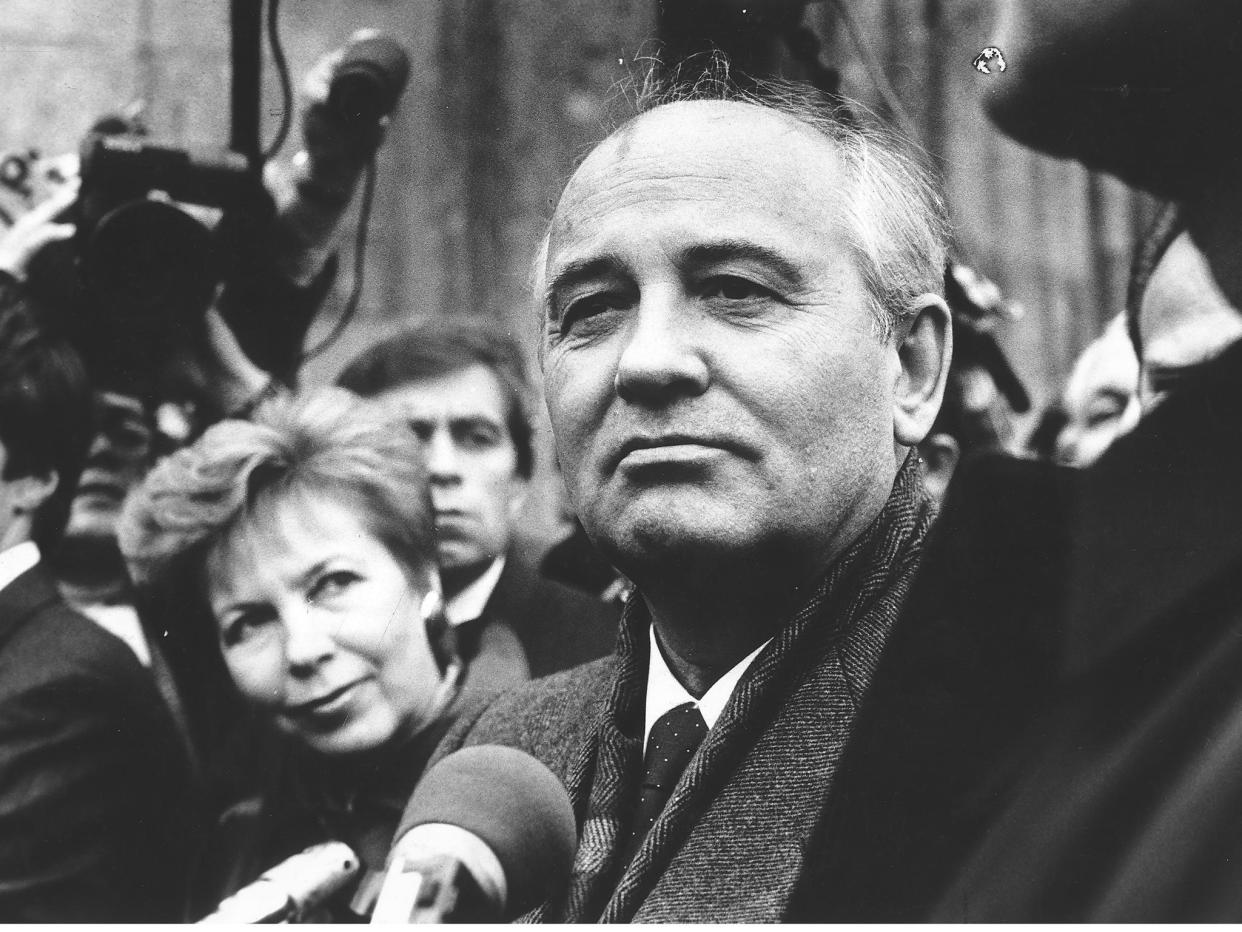Is Putin finally ready to learn from Gorbachev?

Mikhail Gorbachev in East Berlin with his wife Raisa in October 1989
(Independent)- Oops!Something went wrong.Please try again later.
- Oops!Something went wrong.Please try again later.
Happy 90th birthday, Mikhail Sergeyevich Gorbachev. Or “Gorby”, as the West came to know you, the man Margaret Thatcher said we could do business with. And what business we did: ending the Cold War, welcoming Russia back into the family of free nations, and liberating smaller republics wishing to chart their own destiny.
Perestroika (economic restructuring) and glasnost (civic openness and transparency) meant that Russia was a better place in 1991, when the Soviet Union finally collapsed, than it was when your era began in 1984.
You were the last ruling general secretary of the Communist Party of the Soviet Union. What now of your legacy, Gorby?
In Russia, many see Gorbachev as a disaster, a vandal who needlessly dismantled the USSR, an undoubted superpower. This, so the argument goes, led to a long, painful era of Russian decline, reversed only when Vladimir Putin came to power and began to reassert Russian power and ambition.
But this, in fact, meant starting small wars with Georgia, Ukraine, annexing Crimea, propping up the dictatorship in Byelorussia, puppeteering the wars between Armenia and Azerbaijan, backing client regimes in Syria and Iran, assassinating ex-spies, using chemical weapons, boosting arms spending and re-equipping the Russian military. Putin now wants to strengthen Russia’s nuclear armoury. It is all as if Gorby had never existed.
Gorbachev became a prophet dishonoured in his own land, even as he was lauded in the West. He regularly came bottom in the polls of great Russians, behind the likes of Stalin and even Brezhnev. Putin seems to stand against everything Gorbachev stood for.
Yet now, Putin has seen fit to offer some recognition to the old boy, if not exactly gratitude. The official birthday greeting from the Kremlin has an almost Soviet ring to it: “You rightfully belong to the galaxy of bright, extraordinary people, outstanding statesmen of our time who have had a significant influence on the course of domestic and world history.”
That doesn’t necessarily mean Putin has come round to Gorbachev’s way of thinking, and is about to unleash multi-party democracy, the rule of law and a free media on the benighted Russian people. That might be asking too much. But it might just mean that Putin, a thoughtful, calculating, cunning figure, might be reassessing his options, post-Trump.
As Gorbachev had in the 1980s, Putin today has a choice. He can either persist with his new Cold War and carry on interfering in other countries’ affairs and fighting futile cruel wars, to the detriment of the living standards of his own people. Or he can try and get onto better terms with the West, co-operate and understand that power and influence in this century is no longer about occupying territory and subjugating peoples, acts of naked old-fashioned imperialism even the Americans no longer indulge in. Gorbachev would give up the endless war in Afghanistan, in part a proxy war with America, and Putin should do the same with his own adventurism in the Middle East.
When it comes down to it, the clash of real interests between Russia and the West is slight, as it always has been. Every so often a Russian leader and an American president will come to recognise this, as did Nixon and Brezhnev, and, after a period in the deep freeze, Reagan and Brezhnev. There is no good reason why the Russians cannot end their aggressive tendencies right now. If they do not, and they institute a fresh arms race, then eventually they will be outspent by the West, until such point that the Russian economy grows so weak and its people so poor that it has to throw the towel in. That was what Gorbachev realised, and he confronted the truth, though his people have never thanked him for doing so.
The end of the Soviet Union was supposed to be the “end of history”, the moment when the ideological struggle between communism and Western liberal values came to an end. That was certainly what Gorbachev had in mind. Things have panned out rather differently. The better news is that sooner or later someone usually takes the initiative, bravely, as Gorbachev did, and tries to push the reset button.
As late as 1987 or 1988, the USSR looked like it might survive for decades to come. Born in revolution, the Soviets had defeated fascism and were still an equal superpower with America. Yet only four years later, the USSR had disappeared with hardly a shot being fired, collapsing under the economic strain. It was simply unsustainable, as Gorbachev, above all, realised. Does Putin?
Read More
Mikhail Gorbachev, the last leader of the USSR, turns 90 and will celebrate on Zoom
Mikhail Gorbachev blames TV show Dallas for the fall of communism and the USSR, says Dave Stewart

